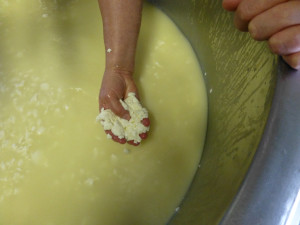Cheese whey fermented by an industrial starter consortium of lactic acid bacteria was evaluated for its antibacterial capacity to control a selection of pathogenic bacteria. For their relevance on outbreak reports related to vegetable consumption, this selection included Listeria monocytogenes, serotype 4b, Escherichia coli O157:H7, and Salmonella Goldcoast.
 Organically grown lettuce was inoculated with an inoculum level of ∼107 colony-forming unit (CFU)/mL and was left for about 1 h in a safety cabinet before washing with a perceptual solution of 75:25 (v/v) fermented whey in water, for 1 and 10 min. Cells of pathogens recovered were then counted and their number compared with that obtained for a similar treatment, but using a chlorine solution at 110 ppm.
Organically grown lettuce was inoculated with an inoculum level of ∼107 colony-forming unit (CFU)/mL and was left for about 1 h in a safety cabinet before washing with a perceptual solution of 75:25 (v/v) fermented whey in water, for 1 and 10 min. Cells of pathogens recovered were then counted and their number compared with that obtained for a similar treatment, but using a chlorine solution at 110 ppm.
Results show that both treatments, either with chlorine or fermented whey, were able to significantly reduce (p < 0.05) the number of bacteria, in a range of 1.15–2.00 and 1.59–2.34 CFU/g, respectively, regarding the bacteria tested. Results suggest that the use of fermented whey may be as effective as the solution of chlorine used in industrial processes in reducing the pathogens under study (best efficacy shown for Salmonella), with the advantage of avoiding health risks arising from the formation of carcinogenic toxic chlorine derivates.
Preliminary study on the effect of fermented cheese whey on Listeria monocytogenes, Escherichia coli O157:H7, and Salmonella Goldcoast populations inoculated onto fresh organic lettuce
Maria I.S. Santos,1,2,3,4 Ana I. Lima,4 Sara A.V.S. Monteiro,4 Ricardo M.S.B. Ferreira,4 Laurentina Pedroso,3 Isabel Sousa,2 and Maria A.S.S. Ferreira1
1Microbiology Laboratory, Department of Natural Resources, Environment and Territory, DRAT, LEAF, Instituto Superior de Agronomia, Universidade de Lisboa, Lisbon, Portugal.
2Eco-Processing of Food and Feed, CEE, LEAF, Instituto Superior de Agronomia, Universidade de Lisboa, Lisbon, Portugal.
3Faculty of Veterinary Medicine, Universidade Lusofona de Humanidades e Tecnologias, Lisbon, Portugal.
4Disease & Stress Biology, DRAT, LEAF, Instituto Superior de Agronomia, Universidade de Lisboa, Lisbon, Portugal.
Foodborne Pathogens and Disease, doi:10.1089/fpd.2015.2079
